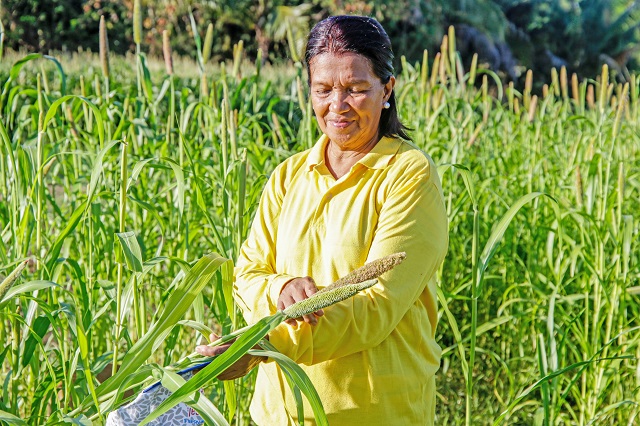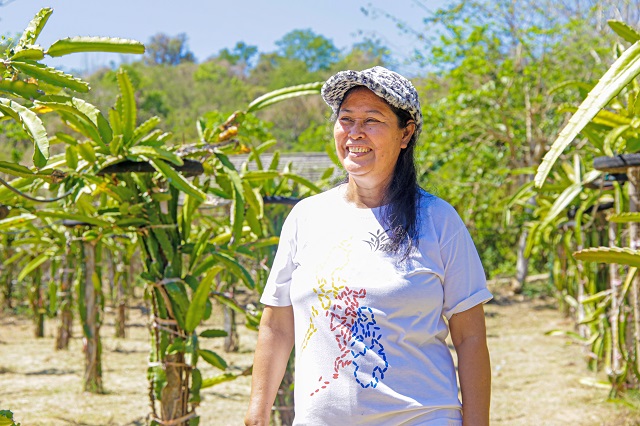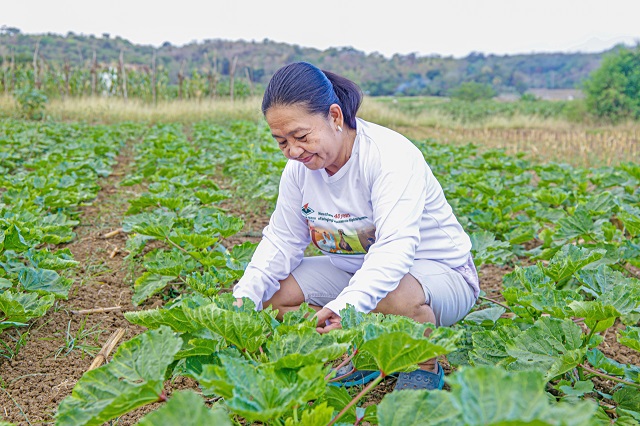Three women farmers in Currimao, Ilocos Norte retell their stories of separation, hard work, and triumph with DA-PhilRice Batac. They were the Institute’s farmer-partners in implementing the Palayamanan and the JICA Technical Cooperation Projects (TCP) 3 a couple of decades or so ago.
Palayamanan is a diversified integrated rice-based farming system that aimed to maximize the use of resources, reduce farming risks, enhance sustainability, productivity and profitability, and improve economic stability, food security, and hopefully better relationship among members of a farm family. Meanwhile, the Japan International Cooperation Agency’s (JICA) – PhilRice TCP 3 aimed to develop and promote location-specific integrated high-yielding rice and rice-based technologies.
“Farmers in Currimao are receptive to new technologies. They are PhilRice fanatics, too. Hence, we continuously welcome projects from DA-PhilRice for our farmers,” said Ericson B. Biag, municipal agriculturist of Currimao.
Teresita I. Allado, 66 , Former Chair, Municipal Agriculture and Fishery Council

“I had been growing rice, corn, and vegetables. I was looking for technologies to improve my yield. So when DA-PhilRice Batac tapped me as a farmer-cooperator in 2001, I did not hesitate,” she vividly recalled.
Bringing the technologies that she learned from the Farmer Field School (FFS) to her own farm was not easy. She lamented her fight with her husband. He didn’t believe in the technologies and practices being taught in their FFS so she decided to have their farms managed separately. This ‘separation’ lasted for 15 years. Her husband eventually gave up upon seeing his wife’s farm repeatedly outperforming his field.
Teresita shared some of the practices she learned from their FFS. She emphasized the importance of the right kind, amount, and timing of fertilizer application. She also recognized the advantage of using high-quality seeds. She realized the value of record-keeping, as well.
“I owe my success to DA-PhilRice. It changed my life for the better,” she smiled.
“If not for DA-PhilRice sharing their technologies and practices coupled with my values of perseverance, patience, and hard work, we could still be living in a nipa hut until today. I couldn’t send my children to school. I wouldn’t have the opportunity to travel to different parts of the country for free. I wouldn’t be tapped as a resource speaker in agri-related convocations. I wouldn’t be a recipient of various awards. I wouldn’t be a local farmer-technician and the Municipal Agriculture and Fishery Council chair,” she proudly and gratefully enumerated.
“I was once a mere PhilRice cooperator but for almost two decades, I can now feel that I am one of PhilRice’s family members,” Teresita confided with teary eyes.
Agnes M. Asuncion, 61, Integrated farmer and entrepreneur

“I was an overseas Filipino worker in Hongkong for 22 years. When I got back here, I was just bored so I joined my husband in attending the FFS. It didn’t dawn on me that I would become a farmer,” she said with a smile, shaking her head.
While joining the FFS, she observed the lady staff of DA-PhilRice Batac working in the field together with the Japanese experts and she rebuked herself, “If these women can, why can’t I?” She was inspired by their dedication so she completely embraced the noble profession of farming.
“There’s no training that is comparable with JICA-PhilRice. I followed every lesson they taught us,” she said.
And, the best learning she could share from participating in the project was the concept of intercropping to optimize a small area for the whole year, and the habit of showing tender loving care (TLC) in growing crops. Until now, she applies TLC and practices intercropping by planting rice in between the row of posts of dragon fruit plants.
She also shared that it is through a PhilRice activity where she learned about how to grow “dragons”.
“Thanks to farming! I was able to send my two children to school. I have a teacher and an entrepreneur. I could easily provide what is needed in my farm and in making dragon fruit-based products,” she said with a brimming smile.
Now, she makes a good income from growing dragon fruit plants and producing wine, oil, and soap from the said fruits. Who says money couldn’t grow on prickly plants?
Margarita G. Allado, 59, Chair, Local Committee on Agriculture

“I was invited by DA-PhilRice Batac to a meeting to participate in its Palayamanan project. I couldn’t hide my willingness to join. I awfully wanted to equip myself with new techniques or technologies,” she admitted.
Among the new things taught to them that caught her interest was the use of plastic trays in vegetable seedling production. The use of only a bag of rice seeds for a hectare was also new to her as she used to sow three bags of seeds.
Farming has providentially brought her far. It all started with the new knowledge she learned from the project. Now, she has a concrete 2-floor house. She has an accountant, an electrical engineer, and a medical technologist. She has an agrisupply shop. She buys and sells rice. She is into swine and fish production, too. She also serves as a local official in their place and leads the committee on agriculture.
“Other people would often ask me why do I still work in the farm if I am now enjoying a good life? I tell them that I cannot abandon farming because this brought me where I am now. I will never be ashamed of being a farmer,” she said with a smile.
She dreamt of a good life for her family so she worked hard for it. She doesn’t waste her time in gossiping. She only spends her time in farming and is preoccupied looking for business opportunities out of it.
“The good life that I have, I owe it to God. That’s why I also share my blessings to others especially to my fellow farmers,” she said humbly. Amen.




